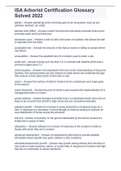Abscission zone - Study guides, Class notes & Summaries
Looking for the best study guides, study notes and summaries about Abscission zone? On this page you'll find 41 study documents about Abscission zone.
Page 4 out of 41 results
Sort by
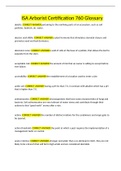
-
ISA Arborist Certification 760 Glossary
- Exam (elaborations) • 80 pages • 2023
-
- $11.99
- + learn more
abiotic: CORRECT ANSWER pertaining to the nonliving parts of an ecosystem, such as soil particles, bedrock, air, water. abscisic acid (ABA): CORRECT ANSWER a plant hormone that stimulates stomatal closure and promotes seed and bud dormancy. abscission zone: CORRECT ANSWER a wall of cells at the base of a petiole, that allows the leaf to separate from the stem. acceptable risk: CORRECT ANSWER the amount of risk that an owner is willing to accept before tree failure. accessibility: COR...
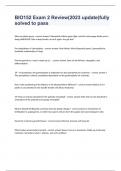
-
BIO152 Exam 2 Review(2023 update)fully solved to pass
- Exam (elaborations) • 4 pages • 2023
- Available in package deal
-
- $9.99
- + learn more
BIO152 Exam 2 Review(2023 update)fully solved to passWhy are plants green - correct answer Chlorophyll reflects green light, and this cute puppy thinks you're doing AWESOME! Take a deep breath, ok do it again. You got this! Pre-adaptations of charophytes - correct answer Fresh Water, Wind-dispersed spores, Sporopollenin, Symbiotic relationship w/ fungi Primary growth in a root is made up of... - correct answer Zone of cell division, elongation, and differentiation T/F - In bryophytes, ...
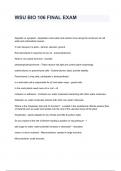
-
WSU BIO 106 FINAL EXAM Questions And Answers
- Exam (elaborations) • 8 pages • 2024
-
- $11.39
- + learn more
WSU BIO 106 FINAL EXAM Apoplast vs symplast - Apoplastic route water and solutes move along the continuum of cell walls and extracellular spaces 3 main tissues of a plant - dermal, vascular, ground Root developed in response to low o2 - pneumatophores What is not a plant hormone - secretin phototropin/phytochrome - These receive red light and control plant morphology sclerenchyma vs parenchyma cells - Sclerenchyma: dead, provide stability Parenchyma: Living cells, p...

-
ISA Arborist Certification Glossary Questions with Complete Solutions(SCORED A+)
- Exam (elaborations) • 54 pages • 2023
-
- $12.99
- + learn more
abiotic: - ANSWER-pertaining to the nonliving parts of an ecosystem, such as soil particles, bedrock, air, water. abscisic acid (ABA): - ANSWER-a plant hormone that stimulates stomatal closure and promotes seed and bud dormancy. abscission zone: - ANSWER-a wall of cells at the base of a petiole, that allows the leaf to separate from the stem. acceptable risk: - ANSWER-the amount of risk that an owner is willing to accept before tree failure. accessibility: - ANSWER-the establishment ...
ISA Arborist Certification Glossary Solved 2022

-
ISA- Arborist Exam Review Graded A+
- Exam (elaborations) • 36 pages • 2022
- Available in package deal
-
- $18.49
- + learn more
abiotic - ANSWER pertaining to the nonliving parts of an ecosystem, such as soil particles, bedrock, air, water. abscisic acid (ABA) - ANSWER a plant hormone that stimulates stomatal closure and promotes seed and bud dormancy. abscission zone - ANSWER a wall of cells at the base of a petiole, that allows the leaf to separate from the stem. - two functions: leaf drop and to protect the region of the stem against desiccation acceptable risk - ANSWER the amount of risk that an owner is...
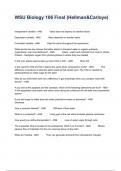
-
WSU Biology 106 Final (Hellman&Carloye) Questions With Correct Solutions
- Exam (elaborations) • 24 pages • 2024
-
- $12.89
- + learn more
WSU Biology 106 Final (Hellman&Carloye) Independent variable - ANS Value does not depend on another factor Dependent variable - ANS Value depends on another factor Controlled variable - ANS Kept the same throughout the experiment What are the two key tissues that allow plants to transport water or organic nutrients, respectively, over long distances? - ANS Xylem - water and minerals from roots to shoots Phloem - transports sugars from ...
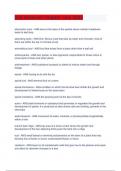
-
ISA Arborist Chapter One 2023 Q&A full solution 100% verified
- Exam (elaborations) • 5 pages • 2023
-
- $6.89
- + learn more
ISA Arborist Chapter One 2023 Q&A full solution 100% verified abscission zone - ANS-area at the base of the petiole where cellular breakdown leads to leaf drop absorbing roots - ANS-fine, fibrous roots that take up water and minerals; most of them are within the top 12 inchest of soil

-
ISA- Arborist Review |463 questions| with correct answers
- Exam (elaborations) • 54 pages • 2023
-
- $10.49
- + learn more
abiotic CORRECT ANSWER pertaining to the nonliving parts of an ecosystem, such as soil particles, bedrock, air, water. abscisic acid (ABA) CORRECT ANSWER a plant hormone that stimulates stomatal closure and promotes seed and bud dormancy. abscission zone CORRECT ANSWER a wall of cells at the base of a petiole, that allows the leaf to separate from the stem. - two functions: leaf drop and to protect the region of the stem against desiccation acceptable risk CORRECT ANSWER the amount ...
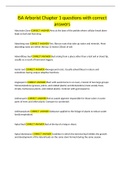
-
ISA Arborist Chapter 1 questions with correct answers
- Exam (elaborations) • 10 pages • 2023
- Available in package deal
-
- $8.99
- + learn more
Abscission Zone CORRECT ANSWER Area at the base of the petiole where cellular break down leads to leaf and fruit drop. Absorbing root CORRECT ANSWER Fine, fibrous roots that take up water and minerals. Most absorbing roots are within the top 12 inches (30cm) of soil. Adventitious bud CORRECT ANSWER Bud arising from a place other than a leaf axil or shoot tip, usually as a result of hormonal triggers. Aerial root CORRECT ANSWER Aboveground roots. Usually adventitious in nature and someti...

Did you know that on average a seller on Stuvia earns $82 per month selling study resources? Hmm, hint, hint. Discover all about earning on Stuvia

